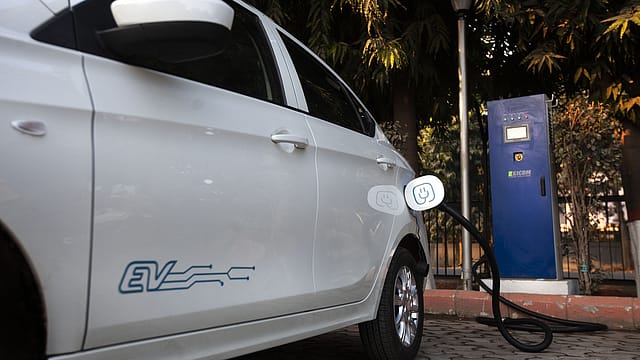EV incentives must go beyond focus on private vehicles: Economic Survey
ADVERTISEMENT

The Economic Survey 2024-25, tabled by Finance Minister Nirmala Sitharaman on Friday, warned that the import intensity of electric vehicle production — especially from countries with whom India has persistent and large trade deficits — is very high, arguing that the extent to which electric mobility is incentivised in the short run needs to keep this factor in mind.
“Given India’s vast size and limited land availability, public transportation is a more efficient alternative for viable energy transition. Therefore, national-level policies and local nudges must promote and facilitate its use, going beyond the focus on tail-pipe emissions of private transportation choices,” the Economic Survey says.
As demand for EVs is expected to grow, dependence on imported components such as DC motors, e-motor magnets, and other electrical parts will likely rise, cautions the Economic Survey. “Leading EV manufacturers have noted an increasing proportion of Chinese imports in their total material expenditures, reflecting a significant dependence on China for certain resources and technical know-how,” it warns.
Expanding the public transportation network is an avenue of reducing dependence on overseas supply chains that e-mobility entails and will entail for quite some time to come, suggests the Economic Survey. “A robust public transportation system will also help reduce traffic congestion, promote energy efficiency, and ensure that the benefits of clean mobility are accessible to all socioeconomic groups, unlike private e-mobility solutions, fostering a more resilient and equitable energy transition,” it says.
In Brazil and China, more than 50% of urban residents enjoy convenient access to mass transit. However, in India, only 37% of urban residents have easy access to public transportation.
India sources 75% of lithium-ion batteries used in EVs from China, whose vertical integration across the entire EV supply chain, from mining to EV manufacturing, has enabled it to retain its global dominance in this sector. About 70% of the world's rare earth minerals, which are critical resources for high-storage batteries, are processed by Chinese companies. China also houses nearly 80% of the world's battery manufacturing capacity.
China's rise in the global auto market has disrupted the long-term incumbents in economies like Germany and Japan, and it dominates the global distribution of critical minerals.
Indigenising the technology and raw materials for electric mobility is an urgent task, recommends the Economic Survey. “Manufacturing an electric vehicle, relative to a conventional car, requires nearly 6 times more minerals to produce, most of which are utilised in producing the EV battery. This is an important consideration as many minerals crucial to EV manufacturing are scarcely available or processed in India,” it says.
The Ministry of Mines has analysed the 33 critical minerals vital to India’s economic security and found that 24 are currently at high risk of supply disruptions.
Going forward, policies for electric vehicles must focus on de-risking supply chains by promoting a more self-reliant ecosystem powered by increased R&D in advanced battery technologies, such as sodium-ion and solid-state batteries, suggests the Economic Survey. “Securing intellectual property in this domain can prove invaluable. Additionally, facilitating investment in battery recycling infrastructure can yield greater long-term gains for the Indian automotive sector.”
China commands a significant share of critical mineral processing and production globally. Across key commodities such as Nickel, Cobalt, and Lithium, China alone is responsible for processing 65%, 68% and 60% of the global output, respectively.
“Lithium-ion batteries will dominate other technologies for quite some time, and their demand is expected to grow at a CAGR of 23% by 2030. The lack of viable alternative battery technologies reinforces China’s dominant position in Lithium-ion batteries,” says the survey.
Cutting down road transport emissions, which comprise nearly 75% of the emissions from the transportation sector, is critical to India achieving its Net Zero goals by 2070, says the Economic Survey. “Electric mobility is an important element in India’s path to Net Zero,” it says, adding that electric vehicles make economic sense in India, which imports most of its oil and has abundant renewable energy and coal.